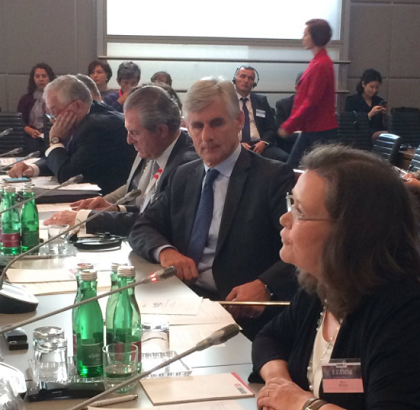
(l-r) Michael Linhart, Austrian Deputy Minister for Europe, Integration and Foreign Affairs listens to Kirsi Madi, UNISDR Director speaking at the OSCE Economic and Environmental Dimension Implementation Meeting
By David Singh
Geneva, 18 October 2017 - Environmental and energy security require innovative approaches that go beyond national borders, Mr. Michael Linhart, Austrian Deputy Minister for Europe, Integration and Foreign Affairs said at a high-level discussion in Vienna this week.
At a meeting of the Organization for Security and Co-operation in Europe (OSCE) on ‘the implementation of OSCE commitments on environment and energy (16-17 October)’, Mr. Linhart said, “The recent series of hurricanes that have devastated parts of the Caribbean and the United States […] but also the devastating storms, flooding and wildfires in Europe and in Central Asia, are painful warnings in this respect.”
The underlying message at the event was that co-operation on environmental and energy issues contributed to preventing tensions, building confidence and promoting good neighbourly relations in the OSCE region and must be strengthened.
Ms. Kirsi Madi, Director of the United Nations Office for Disaster Risk Reduction (UNISDR) said environmental and security concerns were inter-related and the OSCE, with its comprehensive security approach, had an important role to play in addressing disaster risk reduction and climate change adaptation.
“Implementing disaster risk reduction activities addresses the underlying causes of fragility including migration and crises situations. Displacement is an indication of the breakdown of normal coping strategies when resilience is undermined by a severe disaster. The recognized reality that disasters due to natural hazards have no borders has allowed for disaster risk reduction to be a topic that has no diplomatic sensitivities attached to it, which can create a safe and neutral space for dialogue at national and regional levels,” Ms. Madi said.
“We are living in an interlinked society where siloed practices are no longer an option”, Ms. Madi said. “An interlinked society needs to reflect on the concept of shared responsibility. Disaster risk is rarely made explicit to investors and is often only discovered in the event of a disaster. Investors or developers rarely take responsibility or accountability for the disaster risk that may be generated and sold on. It is therefore crucial to ensure an all-of-society inclusive approach in looking at disaster risk.”